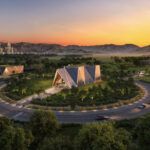The legacy of Hiroshima: Nuclear tyranny or democracy?
By Kennette Benedict | August 9, 2015
After the atomic bombings of Hiroshima and Nagasaki in 1945, scientists and engineers returned to their universities from Los Alamos and other sites of the Manhattan Project and immediately began to talk and write about what to do about the Bomb. Their horror at the unparalleled destructive power of the atom was matched by their conviction that the public should have a say in how their government developed and used that power.
That conviction was exemplified by the clock image that first appeared on the cover of the Bulletin of the Atomic Scientists in June 1947. The scientist editors wished to speak directly and vividly to a wide audience about the dangers, to warn even those without technical knowledge about the terrible future that humanity was facing. They referred to it as “the clock of doom.”
One legacy of Hiroshima and Nagasaki was the fear that knowledge about nuclear bombs and their delivery systems would give the other side an edge in the arms race, which has resulted in a level of state secrecy in the United States and other nuclear weapons states that makes a mockery of our democratic aspirations.
But another legacy, of democratic determination, is a gift from the Manhattan Project scientists’ habit of openness and their faith in democratic action. This is a legacy worth cherishing and deepening as we seek a world free of nuclear weapons.
Although governments classify as national security secrets information about nuclear weapons capabilities and force structure, independent scientists and other technical experts currently publish estimates of the number and type of nuclear weapons that states possess and report on the quantities of nuclear bomb making materials worldwide. They also provide information about the current status of launch readiness and about the weaknesses of command and control systems in the United States (as, for example, in the work of Bruce Blair and Eric Schlosser.
These valuable reports are often ignored. Yet the perils of huge arsenals (well over 16,000 nuclear bombs worldwide), the potential for accidents, and the readiness to launch missiles that could bring untold devastation in a matter of minutes are too great to remain in the shadows of public debate. It is past time for journalists and political candidates to talk openly about these perils. It is high time that citizens demanded answers to questions, in town hall meetings and presidential campaign debates, in congressional hearings and on social media, among other venues, about nuclear weapons and bomb-making materials.
Just as economic, education, and health policies are openly debated daily in forums, with publicly available information, so too should nuclear weapons policy be the object of scrutiny, skepticism, and open citizen discussion. In other words, nuclear weapons policy should be a routine part of policy and political debate.
But what does democracy have to do with national security and nuclear arsenals? Policy experts are often skeptical, telling us that understanding the technical dimensions of nuclear weapons and their delivery systems is beyond the capacity of most citizens. Furthermore, theories of nuclear deterrence and even the moral trade-offs inherent in the implementation of those theories are simply too complex, many experts believe, for any but the most erudite to grasp. And finally, an enemy attack is likely to come without warning and thus, without time for a deliberative democratic discussion about how to respond. National security officials conclude that it would be irresponsible for any leader, whose first duty is to protect the nation, to allow for a more open discussion of nuclear weapons policy in circles that lack the technical knowledge the officials themselves possess, and certainly, they contend, such a discussion should not be fostered at a moment of crisis.
With such arguments from their leaders, citizens of the greatest democracies in history are disenfranchised. Just as slaves were in the US South, and women were until winning the vote in 1920, today we, the people as a whole, are subjugated to those who insist they know what is best for us. The “guardians of the arsenal” determine whether we live or die, whether our societies flourish or perish, all without knowing what we think and without allowing our participation.
What can be done to free ourselves of this tyranny? How can ordinary citizens influence decisions about nuclear weapons?
The disarmament movement of the 1950s, sparked by medical discoveries of strontium-90 in babies’ teeth and human breast milk, helped bring an end to atmospheric nuclear testing in the early 1960s. The U.S.-based Freeze movement of the 1980s, along with the European disarmament movement, brought pressure on leaders to end the US-Soviet nuclear stand-off and end the Cold War. Likewise, the emerging contemporary humanitarian effects movement is raising the awareness of developing country leaders about the likely damage and costs to their countries of even a limited nuclear exchange between states.
These appeals have used fear of the consequences of nuclear weapons to arouse citizens and political leaders to protest government policies. Disarmament movement leaders speak in terms of catastrophic destruction, of tens of millions dead, of apocalyptic landscapes, and yes, of Doomsday. The purpose is to draw the public’s attention to the risks and to the certain effects of nuclear explosions, with a view to avoiding such gloomy ends.
In addition, the demands of nuclear weapons disarmament movements are couched in terms of the government’s responsibility to its citizens, and its role as guarantor of our collective security as a nation. These citizen movements are asking their leaders to reduce the risk and fear and to protect us all from the consequences of nuclear weapons.
Fear is a great motivator and seeking the protection that governments are constitutionally bound to provide is reasonable. But it seems to me that arguments based only on fear of nuclear weapons and anger at the irresponsibility of our governments place citizens at a relative disadvantage. Fear can also paralyze, and anger at the failures of government can seem fruitless.
A different set of ideas, based on democratic values of freedom and equality, might provide the positive motivation required for nuclear weapons disarmament over the long haul. These ideas have been the bedrock of democratic movements worldwide and animated the scientists’ movement right after the Japan bombings. In these movements, the motivation to act is based on the promise of freedom to participate as equal members of society in the decisions that affect us directly.
In contrast, the secrecy and lack of representation in formulating nuclear weapons policy that now exists renders citizens slaves to those in control of the Bomb. As political theorist Robert Dahl puts it, “most of the crucial choices about nuclear weapons strategy have been made by a very small group of decision makers whose decisions, including those of the president, have been subject only weakly, if at all, to democratic procedures. For all practical purposes, on these matters no public opinion existed and the democratic process was inoperable.”
In decisions about using nuclear weapons, the question is whether nuclear weapons states currently derive their just powers from the “consent of the governed,” as the US Declaration of Independence demands. I believe the answer is no. There have been congressional hearings and votes about waging war in Iraq and Afghanistan, and even about the current nuclear negotiations with Iran, but when it comes to United States’ nuclear war-fighting, there has been no public debate.
Is the atrophy of democracy another legacy of Hiroshima and the Bomb? If this is the case, as I think it is, what can be done to address the fundamental contradiction between democratic practice and government deployment of nuclear weapons?
I believe that part of the solution can be found in the scientists’ movement and its promise of renewed democracy. In the struggle against secrecy and in efforts to inform the public, the scientists of the Manhattan project and their intellectual descendants give citizens the knowledge to participate as equals in decision making about nuclear weapons.
How would a serious, open debate over nuclear weapons plans, deployment, and spending come about? Who would push for it?
Current civic campaigns to support or criticize the Obama administration’s negotiations with Iran may serve as a model of such public review. The pubic debate has stimulated a comparatively open discussion about the terms of the deal with Iran and about even the technical details of uranium enrichment programs and their relationship to nuclear bomb building, as well as civilian nuclear power.
A similar campaign could focus on the United States’ own nuclear arsenals and plans for deployment, including currently funded programs for modernizing forces. The rules for Congressional hearings could be modified so that all acquisition and deployment plans, including war-fighting plans, would be public knowledge and subject to scrutiny. In addition to questioning particular expenditures, nuclear disarmament groups would focus as much on the right to participate in decision making as they would on ridding the budget of specific line items and military programs—as they do now.
Some in the executive branch will claim that revealing nuclear war-making plans would only advantage our adversaries by providing knowledge that allows them to develop specific counterforce plans. The fact is that allies and competitors alike are already modernizing their own forces out of fear that all the other nuclear weapons states are developing ever more sophisticated and lethal weapons. None wants to be left behind.
The real losers in these arms races, however, are the citizens and taxpayers of all the nuclear weapons states, who end up paying for even larger, more powerful weapons and delivery systems than already exist, without having a say in the fundamentals of their own defense.
The democratic ideals of freedom and equality, coupled with information-rich public discussions of declassified nuclear war plans, will contribute to a world free of nuclear weapons by motivating citizens to demand their rightful place in policymaking. The scientists’ 70-year legacy of democratic openness and technical knowledge can empower people with its promise of enfranchisement and freedom—freedom from the tyranny of nuclear weapons.
Together, we make the world safer.
The Bulletin elevates expert voices above the noise. But as an independent nonprofit organization, our operations depend on the support of readers like you. Help us continue to deliver quality journalism that holds leaders accountable. Your support of our work at any level is important. In return, we promise our coverage will be understandable, influential, vigilant, solution-oriented, and fair-minded. Together we can make a difference.
Topics: Columnists, Nuclear Weapons














